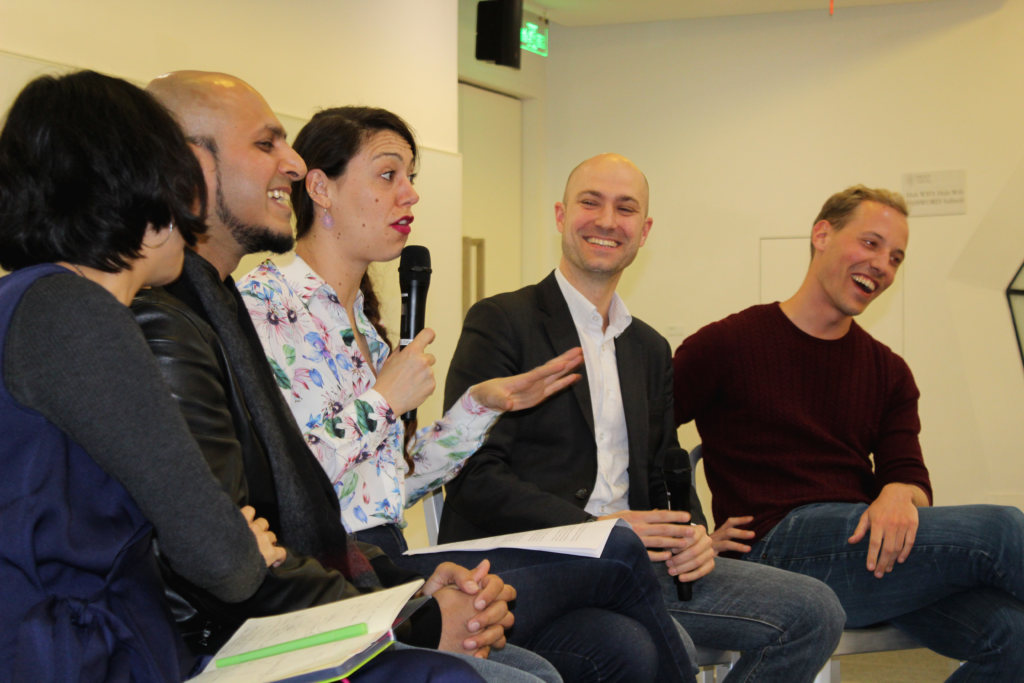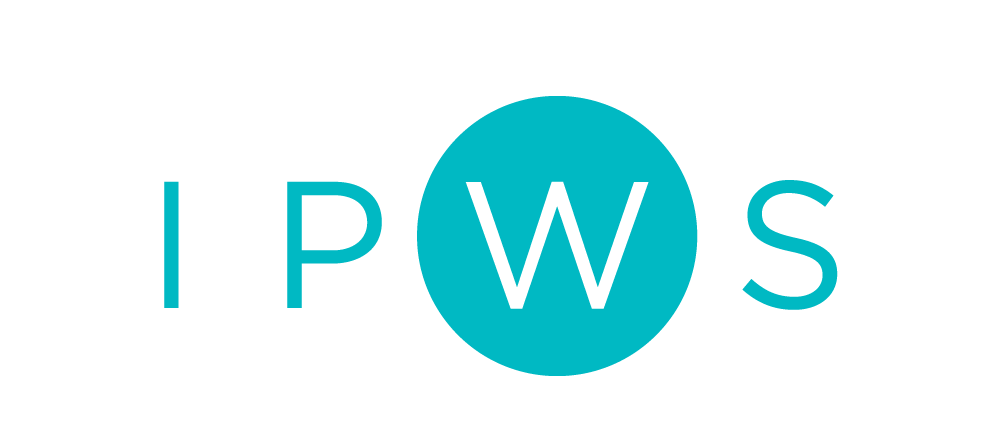
On February 28
th IPWS had the pleasure of hosting a lively panel of intrapreneurship aficionados who spoke about their passion for creating change from within companies. The four panelists, all with different backgrounds and different approaches to intrapreneurship, were lead by moderator Rachel Daydou, APAC Innovation Director at Fabernovel. The panel had a candid dialogue with each other and the audience about the benefits, challenges, and misconceptions people have about leading and creating change from within your own company.

For those who work in large companies, creating change may seem like a daunting task. When you are faced with multiple levels of management, powerful stakeholders, and layers of red tape it can be hard to find the inspiration to make an impact. Vivian Hartman, Founder of Vivaciously, who works very closely with Bayer in their open innovation program facilitating internal and external collaboration, sparked an “ah-ha” moment when she said “a bumble bee flies because he doesn’t know he can’t.” You’ll never know what you can create if you don’t acknowledge you can create something in the first place.
So why is innovation so important in this day and age?
Kapil Kane, Director of Innovation at Intel, argued that at some point, large corporations must either embrace intrapreneurship, or be disrupted. We live in a time where the cost of opening a startup is decreasing, and the millennial workforce is much different than those who came before them. There must be a way to keep them engaged, motivated and give them an outlet for creativity.

So what can you, as a manager, do to cultivate an environment of innovation within your team?
“Give people the room to try different things, and experiment. If you experiment, there is no wrong answer, if it works – then good. If it doesn’t work, then you learn something. Continue to ask people what they have
learned, rather than what they have achieved”
-Kapil Kane, Director of Innovation at Intel China
What about as an employee?
The panel all agreed that having support is one of the most important factors in successful innovation projects. Recruit your supporters and get endorsement straight from the top. The most successful projects that have the best chance of running smoothly, will have the support and backing of the highest ranking person in the company.
How to do this?
Make sure your goals align. Remember, this is not entrepreneurship; you’ll need to deliver the maximum value to someone other than yourself.
When you get commitment from this person, get them to pledge their support. Luuk Eliens, Innovation Lead for the corporate innovation team of Xnode, has helped hundreds of teams and often encourages them to make a video of the CEO or Founder pledging their support and full backing of the project, and then circulating this video throughout the entire company.
It will often be hardest to receive support from mid-level management, so if you can get the endorsement from the top level, make it widely known.
Vivian Hartman encouraged open communication and persistence – “talk with people everyday, recruit people, spread your idea.” The more interest and support you can get, the better. This isn’t a one or 2 person show, the best teams have a wide range of experience, everyone from sales, to marketing, to IT should be encouraged to be involved. Think of it as a mini startup within your own company. A startup needs people from all different backgrounds and disciplines.
Is there risk involved? Olivier Marescq, Senior Project Manager at Pernod Ricard says “of course there is. But the point is, are you willing to take the risk or not? If you like the challenge of doing something different, creating something new – then you know you can do it.”
We’ll leave you with some final advice from Luuk Eliens – when thinking about if intrapreneurship is right for you, ask yourself these three questions;
- What is my attitude towards risk – how much risk am I willing to take on? Can I justify this project to myself and to my direct family? Remember, intrapreneurship is not devoid of all risk.
- Do I want to do an innovation project because I genuinely like innovation, and I’m interested and motivated to do something real? Or am I more after things like, career advancement? If the later, intrapreneurship is probably not the path for you.
- If I’m really interested in becoming intrapreneur, why don’t I just become an entrepreneur? Why do I want to stay with this company? Make sure this answer very clear to you.
Thank you to all of the panelists for engaging us in an important dialogue about the importance of innovation, and the challenges that come along with it. We also want to thank the men and women who filled the room at Hult Business School, for the questions and enthusiasm, we hope everyone left feeling inspired to create change in whatever role you may be in.


 On February 28th IPWS had the pleasure of hosting a lively panel of intrapreneurship aficionados who spoke about their passion for creating change from within companies. The four panelists, all with different backgrounds and different approaches to intrapreneurship, were lead by moderator Rachel Daydou, APAC Innovation Director at Fabernovel. The panel had a candid dialogue with each other and the audience about the benefits, challenges, and misconceptions people have about leading and creating change from within your own company.
On February 28th IPWS had the pleasure of hosting a lively panel of intrapreneurship aficionados who spoke about their passion for creating change from within companies. The four panelists, all with different backgrounds and different approaches to intrapreneurship, were lead by moderator Rachel Daydou, APAC Innovation Director at Fabernovel. The panel had a candid dialogue with each other and the audience about the benefits, challenges, and misconceptions people have about leading and creating change from within your own company.
 For those who work in large companies, creating change may seem like a daunting task. When you are faced with multiple levels of management, powerful stakeholders, and layers of red tape it can be hard to find the inspiration to make an impact. Vivian Hartman, Founder of Vivaciously, who works very closely with Bayer in their open innovation program facilitating internal and external collaboration, sparked an “ah-ha” moment when she said “a bumble bee flies because he doesn’t know he can’t.” You’ll never know what you can create if you don’t acknowledge you can create something in the first place.
So why is innovation so important in this day and age?
Kapil Kane, Director of Innovation at Intel, argued that at some point, large corporations must either embrace intrapreneurship, or be disrupted. We live in a time where the cost of opening a startup is decreasing, and the millennial workforce is much different than those who came before them. There must be a way to keep them engaged, motivated and give them an outlet for creativity.
For those who work in large companies, creating change may seem like a daunting task. When you are faced with multiple levels of management, powerful stakeholders, and layers of red tape it can be hard to find the inspiration to make an impact. Vivian Hartman, Founder of Vivaciously, who works very closely with Bayer in their open innovation program facilitating internal and external collaboration, sparked an “ah-ha” moment when she said “a bumble bee flies because he doesn’t know he can’t.” You’ll never know what you can create if you don’t acknowledge you can create something in the first place.
So why is innovation so important in this day and age?
Kapil Kane, Director of Innovation at Intel, argued that at some point, large corporations must either embrace intrapreneurship, or be disrupted. We live in a time where the cost of opening a startup is decreasing, and the millennial workforce is much different than those who came before them. There must be a way to keep them engaged, motivated and give them an outlet for creativity.
 So what can you, as a manager, do to cultivate an environment of innovation within your team?
“Give people the room to try different things, and experiment. If you experiment, there is no wrong answer, if it works – then good. If it doesn’t work, then you learn something. Continue to ask people what they have learned, rather than what they have achieved”
-Kapil Kane, Director of Innovation at Intel China
What about as an employee?
The panel all agreed that having support is one of the most important factors in successful innovation projects. Recruit your supporters and get endorsement straight from the top. The most successful projects that have the best chance of running smoothly, will have the support and backing of the highest ranking person in the company.
How to do this?
Make sure your goals align. Remember, this is not entrepreneurship; you’ll need to deliver the maximum value to someone other than yourself.
When you get commitment from this person, get them to pledge their support. Luuk Eliens, Innovation Lead for the corporate innovation team of Xnode, has helped hundreds of teams and often encourages them to make a video of the CEO or Founder pledging their support and full backing of the project, and then circulating this video throughout the entire company.
It will often be hardest to receive support from mid-level management, so if you can get the endorsement from the top level, make it widely known.
Vivian Hartman encouraged open communication and persistence – “talk with people everyday, recruit people, spread your idea.” The more interest and support you can get, the better. This isn’t a one or 2 person show, the best teams have a wide range of experience, everyone from sales, to marketing, to IT should be encouraged to be involved. Think of it as a mini startup within your own company. A startup needs people from all different backgrounds and disciplines.
Is there risk involved? Olivier Marescq, Senior Project Manager at Pernod Ricard says “of course there is. But the point is, are you willing to take the risk or not? If you like the challenge of doing something different, creating something new – then you know you can do it.”
We’ll leave you with some final advice from Luuk Eliens – when thinking about if intrapreneurship is right for you, ask yourself these three questions;
So what can you, as a manager, do to cultivate an environment of innovation within your team?
“Give people the room to try different things, and experiment. If you experiment, there is no wrong answer, if it works – then good. If it doesn’t work, then you learn something. Continue to ask people what they have learned, rather than what they have achieved”
-Kapil Kane, Director of Innovation at Intel China
What about as an employee?
The panel all agreed that having support is one of the most important factors in successful innovation projects. Recruit your supporters and get endorsement straight from the top. The most successful projects that have the best chance of running smoothly, will have the support and backing of the highest ranking person in the company.
How to do this?
Make sure your goals align. Remember, this is not entrepreneurship; you’ll need to deliver the maximum value to someone other than yourself.
When you get commitment from this person, get them to pledge their support. Luuk Eliens, Innovation Lead for the corporate innovation team of Xnode, has helped hundreds of teams and often encourages them to make a video of the CEO or Founder pledging their support and full backing of the project, and then circulating this video throughout the entire company.
It will often be hardest to receive support from mid-level management, so if you can get the endorsement from the top level, make it widely known.
Vivian Hartman encouraged open communication and persistence – “talk with people everyday, recruit people, spread your idea.” The more interest and support you can get, the better. This isn’t a one or 2 person show, the best teams have a wide range of experience, everyone from sales, to marketing, to IT should be encouraged to be involved. Think of it as a mini startup within your own company. A startup needs people from all different backgrounds and disciplines.
Is there risk involved? Olivier Marescq, Senior Project Manager at Pernod Ricard says “of course there is. But the point is, are you willing to take the risk or not? If you like the challenge of doing something different, creating something new – then you know you can do it.”
We’ll leave you with some final advice from Luuk Eliens – when thinking about if intrapreneurship is right for you, ask yourself these three questions;






















